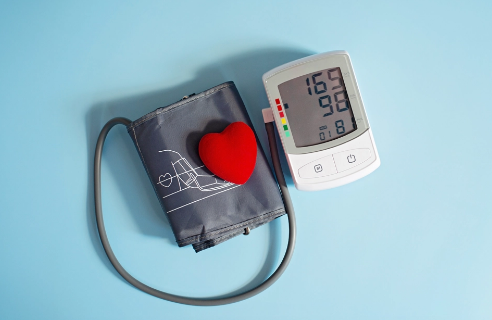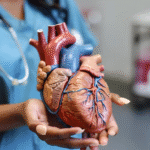Hypertension, or high blood pressure, is a chronic condition that quietly affects millions of people around the world. Often showing no early symptoms, it slowly causes damage to blood vessels, increasing the risk of severe cardiovascular events like heart attacks, strokes, and heart failure. Understanding the impact of hypertension on heart health—and learning how to control it—can be life-saving.
Understanding Hypertension
Hypertension occurs when the force of blood pushing against the walls of your arteries is consistently too high. Blood pressure is measured using two numbers:
- Systolic pressure: the force when the heart pumps blood (top number)
- Diastolic pressure: the pressure when the heart rests between beats (bottom number)
Normal blood pressure is below 120/80 mm Hg. Readings of 130/80 mm Hg or higher are considered hypertensive. Persistent high blood pressure puts extra strain on the arteries and heart, leading to long-term complications.
How Hypertension Affects Heart Health
High blood pressure causes damage throughout the cardiovascular system. Over time, it affects the structure and function of the heart and blood vessels.
Damage to Arteries
Hypertension makes arteries less elastic, which decreases the flow of blood and oxygen to the heart. The inner lining of the arteries can become damaged, triggering the accumulation of plaque. This condition, known as atherosclerosis, narrows the arteries and increases the risk of heart attack and stroke.
Enlarged Heart
As the heart works harder to pump blood against increased pressure, the left ventricle thickens in a condition called left ventricular hypertrophy. While initially a compensation, the thickened heart muscle becomes less effective over time and may lead to heart failure.
Heart Failure Risk
When the heart muscle becomes weak or stiff due to hypertension, it struggles to pump enough blood to meet the body’s needs. This can result in congestive heart failure, where fluid accumulates in the lungs and extremities.
Risk of Heart Attack and Stroke
Plaque formed in narrowed arteries can rupture, leading to blood clots that block blood flow to the heart (heart attack) or brain (stroke). High blood pressure also increases the likelihood of blood vessels rupturing, especially in the brain.
Common Causes and Risk Factors
Hypertension can develop for various reasons, some of which are beyond our control, while others are directly related to lifestyle.
Age and Genetics
Hypertension becomes more common with age. A family history of high blood pressure also increases risk, indicating a genetic predisposition.
Lifestyle Choices
Poor dietary habits, a sedentary lifestyle, obesity, smoking, and excessive alcohol consumption are key contributors to hypertension. High salt intake in particular is strongly linked to elevated blood pressure.
Medical Conditions
Underlying conditions like kidney disease, diabetes, and sleep apnea can also lead to secondary hypertension. Some medications, such as birth control pills and certain pain relievers, may contribute as well.
Warning Signs and Symptoms
One of the most dangerous aspects of hypertension is that it often goes unnoticed. Most people with high blood pressure experience no symptoms until significant damage has occurred.
In some cases, people may experience:
- Persistent headaches
- Shortness of breath
- Dizziness
- Chest pain
- Vision problems
- Nosebleeds
Because of its silent nature, regular screening is essential for early detection and prevention of complications.
How Hypertension Is Diagnosed
Blood pressure is typically measured using a digital monitor or manual cuff in a healthcare setting. For a diagnosis, consistent readings over 130/80 mm Hg across multiple visits are required.
Doctors may also order additional tests to determine the impact of high blood pressure:
- Electrocardiogram (ECG) to evaluate heart rhythm
- Echocardiogram to check for thickened heart muscles
- Blood and urine tests to assess kidney function and cholesterol levels
Strategies to Control Hypertension
The good news is that high blood pressure can be managed—and in many cases reduced—with lifestyle modifications and medical intervention.
Healthy Diet
One of the most effective dietary approaches is the DASH (Dietary Approaches to Stop Hypertension) diet, which focuses on:
- High intake of fruits, vegetables, and whole grains
- Low-fat dairy and lean proteins
- Reduced sodium (ideally less than 1,500 mg/day)
- Avoidance of processed and high-sugar foods
Potassium-rich foods such as bananas, spinach, sweet potatoes, and avocados can help counteract the effects of sodium.
Regular Physical Activity
Physical activity strengthens the heart and improves blood flow. Moderate aerobic activity for at least 30 minutes a day, 5 days a week, can lower systolic pressure by 5–8 mm Hg.
Recommended exercises include:
- Walking
- Jogging
- Swimming
- Cycling
- Aerobic fitness classes
Weight Management
Being overweight significantly increases the risk of hypertension. Losing even 5–10% of your body weight can reduce blood pressure and improve heart health.
Limiting Alcohol and Quitting Smoking
Alcohol can raise blood pressure, especially when consumed in excess. Limit intake to one drink per day for women and two for men. Smoking damages blood vessels, raises heart rate, and contributes to plaque buildup—quitting immediately benefits the cardiovascular system.
Stress Management
Chronic stress is a less obvious but powerful contributor to hypertension. Stress-reducing activities like:
- Meditation
- Deep breathing exercises
- Yoga
- Time in nature
…can help maintain healthy blood pressure levels.
Medication
If lifestyle changes are insufficient, doctors may prescribe antihypertensive medications such as:
- ACE inhibitors (e.g., lisinopril)
- ARBs (angiotensin II receptor blockers)
- Diuretics
- Beta-blockers
- Calcium channel blockers
Treatment plans are individualized, and it’s essential to follow prescriptions and medical advice consistently.
Monitoring and Long-Term Management
Managing hypertension is a lifelong commitment. Regular blood pressure monitoring at home, routine doctor visits, and consistent adherence to treatment are vital.
Digital blood pressure monitors are widely available and can help track progress. Keeping a log of readings can provide valuable data for your doctor to adjust treatment plans.
Conclusion
Hypertension is a major threat to heart health, often progressing silently until a serious event occurs. However, it is both preventable and controllable. Through awareness, regular check-ups, healthy living, and proper medication, you can significantly reduce the risks posed by high blood pressure.
Taking action today—whether through a healthier diet, daily exercise, or quitting smoking—can save your heart tomorrow. Always consult your healthcare provider before making changes, and never underestimate the power of prevention.
Frequently Asked Questions (FAQs)
1. Can hypertension go away completely?
While it may not be “cured,” hypertension can often be brought under control through lifestyle changes and medication. In some cases, individuals with mild hypertension can return to normal levels without lifelong treatment.
2. What is the most dangerous complication of hypertension?
The most serious complications include heart attack, stroke, and heart failure, all of which can be life-threatening.
3. How often should I check my blood pressure at home?
If you have high blood pressure, monitor it at home daily or as recommended by your doctor. If you’re at risk but not diagnosed, check it monthly or during annual physicals.
4. Is coffee bad for people with high blood pressure?
Caffeine can cause a temporary spike in blood pressure. Some people may be more sensitive than others, so it’s best to limit intake and monitor how your body reacts.
5. What is the best time of day to take blood pressure medication?
This depends on the type of medication and your personal health profile. Some are best taken in the morning, others at night. Always follow your doctor’s instructions.





